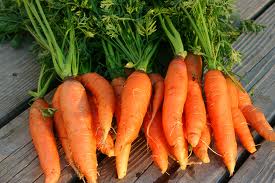 |
Carrot is widely grown across the world and is considered as one of the major sources of beta-carotene (pro vitamin A). Beta Carotene, along with other carotenoids, is a molecule that the body easily changes into Vitamin A and acts as a powerful antioxidant. Vitamin A prevents damage of the white blood cells that are involved in fighting against various infections. While most nutrition labels will list a recommended amount of vitamin A to include in a healthy diet, most health professionals will recommend that beta carotene be the main source of that vitamin A consumption.
|
The reason for this is that beta carotene and other carotenoids are found mainly in fruits and vegetables which contain a host of other vitamins and minerals and are very low in fat.
A carrot contains many other antioxidant molecules which include lutein and lycopene. The carrot offers a multitude of other nutrients that benefit the cardiovascular system, have anti-cancer properties and assist the immune system. It is not a surprise that numerous studies have shown that the health benefits of carrots extend to cardiovascular benefits. Much of this is due to their rich antioxidant content. The cardiovascular system is in need of constant protection from free radical damage. This is especially true for the arteries because they are responsible for transporting highly oxygenated blood throughout the body. Carrots are well known for promoting good vision, and in both humans and dogs, they nourish the optic nerve and promote good visual health.
All the different varieties of the carrot contain very valuable amounts of nutrients with antioxidant values. The amount of phytonutrient antioxidants varies depending on the variety of carrot. For example, the purple and red carrots are well known for their abundance of the antioxidant anthocyanin. The orange carrots are loaded with beta-carotene, accounting for 65% of their entire carotenoid content. Half of the yellow carrots carotenoids are from lutein. It does not matter which variety is chosen, each contains excellent antioxidant benefits.
Adequate levels of antioxidants in the body help to prevent a multitude of disorders including diabetes, hypertension, heart disorders and cancer.Carrots also contain many other bioactive substances known as polyphenols which have potent antioxidant ability. They also contain, in smaller amounts, essential oils, carbohydrates and nitrogenous composites. They are well-known for their sweetening, anti anaemic, healing, diuretic, remineralizing and sedative properties.Carrots are more nutritious when eaten cooked than eaten raw (except when juiced).
Because raw carrots have tough cellular walls, the body is able to convert less than 25 per cent of their beta carotene into vitamin A. Cooking, however, partially dissolves cellulose-thickened cell walls, freeing up nutrients by breaking down the cell membranes. New research from the University of Arkansas indicates that for carrots, at least, cooking may in fact increase their goodness.